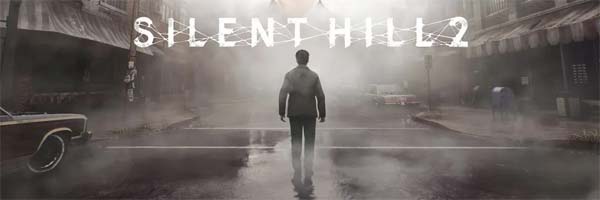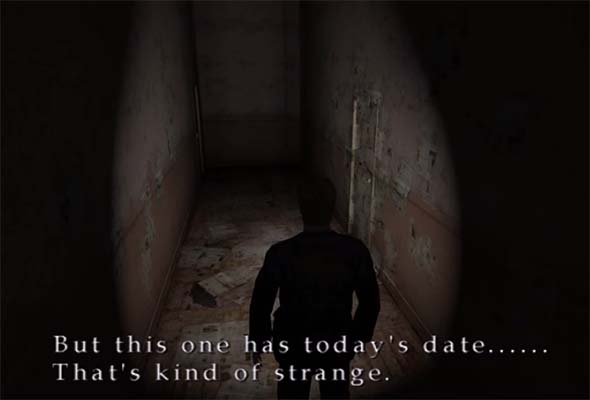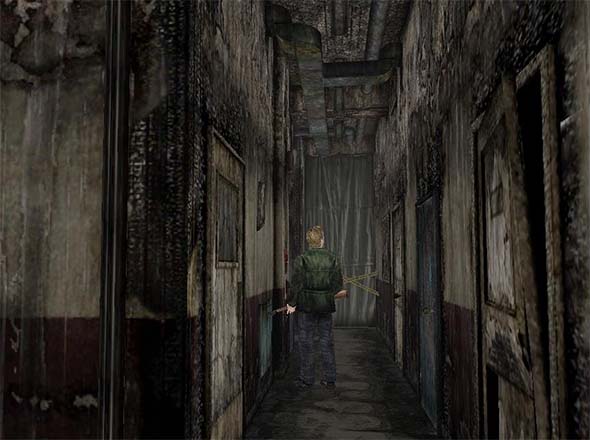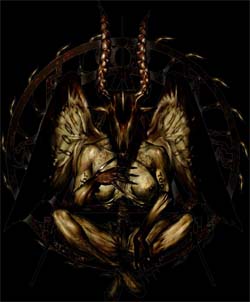
By the time you read this, the remake of Silent Hill 2, being developed by Bloober, is less than 2 months from its expected release. So nothing I write here can possibly change the game. But there has been something that has been nagging at the back of my brain ever since the first trailer for the remake released. Since most of the concern about Bloober's Silent Hill 2 is focused on their historically awful depictions of mental health and trauma, I haven't seen a whole lot of content addressed at this particular concern of mine. So I thought I'd share my thoughts.
First and foremost, I will be discussing the story and ending of the original Silent Hill 2, as well as speculation regarding whether Bloober will change this ending, or somehow botch its execution. As far as I'm concerned, the announcement trailer has already shown that it will be one or the other: a changed ending, or a botched ending. But in any case, if you haven't played Silent Hill 2 before and don't want to be spoiled, then don't read this post. You've been warned.
The announcement trailer for Silent Hill 2: Remake.
Before moving on, feel free to check out the announcement trailer in its entirety, above. You can also watch this complete analysis in video essay format on YouTube.
This entire analysis is also available in video essay format on YouTube.
The original opening
For anyone still here after the spoiler warning, let's talk a little bit about the opening scene of Silent Hill 2, how it relates to the game's ending(s), how this same scene is depicted in the remake trailer, and what the changes to that scene mean for the ending. Silent Hill 2 opens as such:
A mostly calm and collected James Sunderland stares at himself in a dirty bathroom mirror, taking a deep breath, and then walking out to a scenic overlook to explain the premise of the game. He got a letter from his wife, who died of a terminal illness 3 years ago. The letter says that she's alive and waiting for him in Silent Hill. He knows it can't possibly be true, but if there's any chance that she is somehow still alive, he has to know.
This opening shows us a James who is supposedly 3 years removed from the death of his wife. He isn't necessarily grieving any more, but doesn't seem to have completely moved on; otherwise, why be here? Regardless, he is completely surprised by this letter and in disbelief. This is a subtle, subdued opening that gives the player little reason not to take this all at face value. And it goes on to follow this up with a slow-burn opening act to the game, in which James strolls casually through a wooded path along the lake and doesn't encounter anything overtly scary or threatening for a good 20 or 30 minutes, depending on the pace that the player is going.
The original is subdued and gives little reason to not take the premise at face value.
This puts the player in the same headspace as James. We are just as confused, surprised, and curious as him, but with that nagging certainty that all must not be as it seems. This allows the player to role play as James in good faith and sets up the game's eventual twist, and also sets a relatively clean slate for the various ending triggers. The player doesn't see James as anything other than a confused husband, desperately hoping to see his possibly-not-dead wife again. The player is able to play James as such, and how you role play as James will inform how he eventually deals with the game's twist revelation. But the game will be slowly pulling the rug out from under James and the player over the course of the game, gradually establishing him as an un-reliable narrator.
Considering the additional context that this is a sequel to Silent Hill (which was about a father trying to rescue his daughter from a demonic cult), players may have had even less reason to not trust James. They have no clue that this game is going to deviate from the first game's premise and be an introspective and metaphorical tale that is almost completely divorced from the first game's plot. They just know it has the number 2 in the title, so it probably follows from the story of its predecessor. Maybe Mary really is alive? Maybe she's another vessel for the cult's demon god? Or maybe her soul was also split and there's a psychic Mary doppelganger living in Silent Hill who is summoning James to help her stop the cult's plans? Or maybe that doppelganger wants to trick him into helping the cult? And hey, guess what? A few hours into the game, we do indeed meet a Mary doppelganger!
Based on the opening minutes of the game, Silent Hill 2 can go in a lot of potential different directions, either introspective, supernatural, cult-driven, or any combination thereof.
[More]

Video games are unique as an artistic medium. Not only do they allow the consumer to interact with a much wider possibility space than other mediums, but they also allow the consumer to directly influence the art itself. The stories, experiences, messages, and meaning that are conveyed are not only subject to the interpretation of the consumer, but they can be directly influenced or changed by the consumer. In some cases, a game can even prey upon the expectations of the player, or the player's desire to complete the game, in order to convey a particular message, or to make a statement about the player's actions.
One classic example of a game that plays the player as much as the player plays it is Silent Hill 2. That game's endings, and the triggers for each ending, have always been one of my favorite design aspects of that game. Silent Hill 2 takes advantage of the player's preconceived notions about how a horror game should be played, and it uses your play to pivot James' resolution (and his very character) in one of several directions.
Watch a video version of this blog post on YouTube!
I'm going to be talking about Silent Hill 2's endings. It should go without saying that this post will include major spoilers for Silent Hill 2. I'll also be comparing Silent Hill 2 to other games such as Mass Effect, Fallout, The Witcher III, The Last of Us, and What Remains of Edith Finch. As well as the post-Team Silent games: Silent Hill: Homecoming, Silent Hill: Shattered Memories, and Silent Hill: Downpour. So there will also be varying degrees of spoilers for those other games as well.
Spoilers incoming for the above games. Consider yourself warned! [More]

In the comments of a recent post about Silent Hill 2's Otherworld, I had a discussion with a reader about the time period in which the Silent Hill games take place. This is actually an interesting and difficult topic, so I thought that I would dedicate a post specifically to it.
First and foremost, let's remind ourselves of when the games were released:
| Game title | Original release |
 | Silent Hill | January 1999 |
 | Silent Hill 2 | September 2001 |
 | Silent Hill 3 | May 2003 |
 | Silent Hill 4: the Room | September 2004 |
UPDATE 1 January 2020:
A recent tweet from Masahiro Ito claimed that Silent Hill 2 was set in the "late 70's or early 80's", which would make my estimates about 10 later than Masahiro Ito understood the setting to be. If we take evidence in the first Silent Hill game at face value, this would mean that Silent Hill 2 would have to take place prior to the events of Silent Hill, since Silent Hill can take place no earlier than 1987.
It is also possible that Ito's comment is referring to the aesthetics of the game (in keeping with many of the game's film and literary influences), and not necessarily to its actual timeline. It isn't that I don't trust Ito's memory or his authority, but Team Silent went to great pains to conceal the exact date of the games (as we'll discuss in the following post), so it seems that they wanted the years in which the games take place to be ambiguous to the players -- which kind of makes this entire exercise moot.
Contemporary fiction
It is very important to note that no specific dates ever appear in any of the Silent Hill games that were developed by Konami's internal Team Silent studio. If dates are provided, they are either only the month and day (and not the year), or they are time periods relative to the events of the game (such as referring to the "events of 17 years ago" in Silent Hill 3), or it is just the year of an historical event in the past (such as the document about the sinking of the Little Baroness). Even documents that you would expect to have dates (such as newspapers, journals, diaries, patient reports, and police records) are intentionally left dateless (or at least ambiguous).
In Silent Hill 2, there is a point in which James finds newspapers scattered around a hallway. Upon examining the floor or walls, James comments that the newspapers have today's date. This would have been a perfect opportunity for the developers to provide a specific date for the game, if they wanted to. They could have had James read the date on the paper to the player, or the paper itself (with its date) could have been made clearly visible. The developers didn't do this; they left it completely ambiguous.

James notes that these newspapers have today's date, but doesn't tell us what the date is.
The developers went out of their way to not provide any specific dates for the games. Why would they do this? Typically, works of fiction that are not set in particular time period are written to be contemporary. Unless otherwise specified, most works of fiction should be assumed to take place now with respect to the consumption of the work by its audience, regardless of when "now" happens to be. if it's not contemporary to consumption, then it's usually contemporary to creation. This is usually pretty obvious if the work contains detailed descriptions of locations, technologies, and events that can be easily dated.
If we look at the original Silent Hill game in a vacuum, then the game provides no internal indication that it takes place at any specific time period. Players in 1999 probably had no reason to believe that the game took place in any year other than 1999. The same is true for Silent Hill 2, 3, and 4: if looked at in a vacuum, they can all be considered to take place in the same year that they were released. And if you didn't even know the year that the game was released, there's very little within the games to indicate that they take place at any time other than now.
However, this assumption falls apart because there is an absolute time difference of seventeen years between the events of the first game and the events of the third game, even though the difference in time between releases of the games was only four years. So we can't assume that each game takes place in the year of its release. At least one game has to be shifted on the timeline. So which game (or games) should be assumed to have taken place when? [More]
0ad2a2d3-abbc-4fd7-b255-126a5de4f3ba|8|4.8
Tags:Silent Hill, Silent Hill 2, Silent Hill 3, Silent Hill 4: the Room, history, Harry Mason, Heather Mason, James Sunderland, Maria, Henry Townshend, 1980s, 1990s, 2000s, 1986, 1987, 1994, 1999, 2003, 2008, 2016, Jeep Wrangler, telephone, cell phone, smart phone, rotary phone, computer, television, technology, anachronism, timeline, Konami, Team Silent, The Silence of the Lambs, Mary Shepherd-Sunderland

Years ago, I wrote a post regarding the nature of Silent Hill's Otherworld and how it is most likely not a parallel dimension. In it, I may have made a significant mistake. Uh oh. Everybody makes mistakes, and I'm definitely not an exception. But no, I haven't changed my mind and conceded to parallel dimensions :P
Specifically, I failed to consider an important piece of evidence, and therefore may have mischaracterized the Lakeview Hotel Otherworld. In that post, I stated that the burnt-out version of the hotel was the Otherworldly-version that had been transformed as a kind of intermix between James' and Angela's Otherworlds. This is not necessarily true.
In fact, the burnt-out, waterlogged version of the hotel may not be the Otherworld at all. It could be the hotel in its natural state. The "normal"-looking version of the hotel may very well be the Otherworld one.

Is the Lakeview Hotel basement an Otherworld? Or is it the real hotel, as it currently exists?
In this post (as in others that I've written), I'm going to use the term "Otherworld" to refer colloquially to the areas of the game that have undergone supernatural transformations that modify the area substantially from its natural state. I still do not believe that the Otherworld is an actual "other world" that exists separately from reality. I still believe that the entirety of the Silent Hill universe (as created by the original developers) exists in our singular, real world, but is transformed via a supernatural force or entity that is native to the region.
Now, let's talk about the Otherworld in Silent Hill 2!
The Otherworld of Silent Hill 2 is a confusing and complicated issue in the series. Unlike the other games, SH2's Otherworld is much more subtle and restrained. This is due to two reasons. First, having a bloody, industrial Otherworld does not fit the story, since SH2 is a melencholy personal tale about James' mental state in the wake of his wife's death. It's not a game about a cult summoning a corrupt god to reshape the world into a hellish paradise.
Secondly, Silent Hill 2 deals - in part - with the state of the town after the events of Silent Hill [1]. Since Silent Hill shows signs of massive renovation and reconstruction efforts, it is reasonable to assume that Silent Hill 2 takes place shortly after the events of the first game (probably within a year or two; maybe even days or weeks), and that the town is still rebuilding from the devastation that it sustained from the first game. The cult has suffered losses in its leadership, a crisis of faith, and is also in a state of rebuilding and recruiting. As such, the cult does not play an active role in Silent Hill 2. With no God or psychic girl around this time to project her nightmares onto reality, the paranormal activity experienced by the characters of SH2 are likely a lingering effect of the spiritual and psychic interference of the first game. Because of this, the manifestations experienced are much more personal and subdued, as the influences must be pulled from the twisted minds of the few characters in the game.
In fact, the general consensus among Silent Hill fans is that SH2 only has between two and four full Otherworld levels... [More]
6637bd7a-f23b-4eae-b81c-c319b1ffd1b3|12|4.8
Tags:Silent Hill, Silent Hill 2, Otherworld, James Sunderland, Lakeview Hotel, Mary Shepherd-Sunderland, Angela Orosco, fire, arson, space heater, delusion

I was going through the comments on my posts a while back, and I came across a doozy of a comment by user Maiden T. I'm not going to replicate the entire post here, but you can review the comment at the link provided. In summary, the commenter asserts that Silent Hill, as a series, was never about occultism, and that all the games were "repressed-memory morality tales". The first Silent Hill and "to an extent the third one" are the exceptions (according to Maiden T).

Totally unrelated image of a demon god...
My mind just about exploded when I read this comment, and I started typing up a response, only to realize that I had written a whole blog's worth of counter argument. So, I decided to just turn it into a new blog. I'll continue my series of analysis and interpretation articles about Silent Hill with a write-up about how the series is most definitely about occultism.
What is Silent Hill about?
I've already tackled two topics that I consider to be common myths about Silent Hill. The first was about the over-sexualization of Pyramid Head, and the second was about the realness of the Otherworld. Now I'll address one of the most fundamental misunderstandings about the series: what is it about?
The repressed-inner-demon myth
Probably the most core and fundamental myth about the Silent Hill series is the continued propagation of the idea that the series (as a whole) is about characters dealing with repressed inner demons - typically a repressed memory of guilt over a perceived sin which they have committed. This idea is rooted in the popularity of Silent Hill 2. It is so pervasive, that the designers and producers of newer installments of the series embrace it, while dismissing the other critical elements of the other games' stories:
"[My favorite SH game is] Silent Hill 2. I didn’t really care for all the heavy occult based storyline in SH1 and 3. I felt SH2 had the best stand alone storyline, and provided the best atmosphere of all the SH games by far.
[...]
I find all the in’s and out’s of ‘The Order’ to be overly intricate and rather uninteresting, but that’s just my opinion."
- Devin Shatsky (producer, Shattered Memories, Downpour), in an interview with Hell's Descent (Nov 5, 2010).
The reason that Silent Hill 2's design was so successful (and unique within the series) is because SH2's excellent atmosphere was based around feelings of melancholy and depression rather than fear and threat.
Exploring a character's personal guilt and depression works great when the entire game is designed around that central, unifying theme! It doesn't work quite so well when ... [More]
04f88e94-11ac-43f4-beb3-1cd282060bf0|19|4.1
Tags:Silent Hill, Silent Hill 2, Silent Hill 3, Silent Hill 4: the Room, Silent Hill Origins, Silent Hill Homecoming, Silent Hill Downpour, Silent Hill Shattered Memories, Team Silent, Konami, cult, occult, fan fiction, horror, Harry Mason, Alessa, Dahlia Gillespie, Cheryl Mason, Heather Mason, James Sunderland, Red Pyramid Thing, Pyramid Head, Claudia Wolf, Vincent Smith, Henry Townshend, Walter Sullivan, Travis Grady, Alex Shepherd, Shepherd's Glen, Murphy Pendleton, ritual, Flauros, demon, god, Mary Shepherd-Sunderland
|

| 12 | | | | | | | 60 | | 11 | | | | | | | 55 | | 10 | | | | | | | 50 | | 09 | | | | | | | 45 | | 08 | | | | | | | 40 | | 07 | | | | | | | 35 | | 06 | | | | | | | 30 | | 05 | | | | | | | 25 | | 04 | | | | | | | 20 | | 03 | | | | | | | 15 | | 02 | | | | | | | 10 | | 01 | | | | | | | 05 |
|